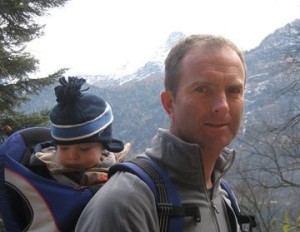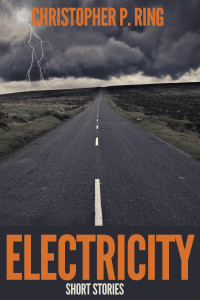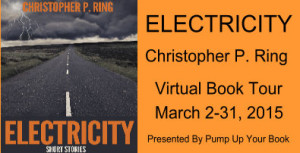Christopher P. Ring writes fiction, poetry, children’s stories, travel essays, social commentaries, humor and screen plays. His writing has appeared in numerous regional magazine and small literary journals such as Caldera and The Broken Bridge Review. He received his Master’s Degree in Creative Writing from the University of New Hampshire and taught High School English for several years in the U.S. and abroad. He continues to teach the art storytelling to Elementary school students in Southern Maine, where he resides with his wife (a teacher too) and two children.
Much of his fiction draws on the experiences and discoveries of his life as a “rambler”. Growing up in Long Island, New York, he developed an insatiable thirst to escape the confines of conventional living, spending his twenties and early thirties travelling the globe to off the beaten path places in search of adventure. He has called many regions of the U.S. his home and has also lived in Ireland, the Andes of Colombia, and Vienna, Austria. As with the cultures and places he has visited, the settings in his story shape the events and characters profoundly.
You can learn more about Christopher P. Ring and check out other writing of his at www.mortalsandfools.com.
His next book, The Glow, a collection of speculative fiction short stories, will be available in April, 2015.
Connect with Christopher:Much of his fiction draws on the experiences and discoveries of his life as a “rambler”. Growing up in Long Island, New York, he developed an insatiable thirst to escape the confines of conventional living, spending his twenties and early thirties travelling the globe to off the beaten path places in search of adventure. He has called many regions of the U.S. his home and has also lived in Ireland, the Andes of Colombia, and Vienna, Austria. As with the cultures and places he has visited, the settings in his story shape the events and characters profoundly.
You can learn more about Christopher P. Ring and check out other writing of his at www.mortalsandfools.com.
His next book, The Glow, a collection of speculative fiction short stories, will be available in April, 2015.
Author Website: www.mortalsandfools.com
Author Blog: www.mortalsandfools.com
Twitter: https://twitter.com/untermarmot
Goodreads: https://www.goodreads.com/author/show/13084642.Christopher_P_Ring
About The Book
Author: Christopher P. Ring
Publisher: Independent Self Publishing
Publication Date: December 5, 2014
Pages: 73
ASIN: B00QOBEIX4
Genre: Literary / New Adult / Short Stories Collection
Format: eBook (.mobi / Kindle), PDF
Buy The Book:
Barnes & Noble: http://www.barnesandnoble.com/w/electricity-christopher-ring/1120893130?ean=2940149963393&itm=1&usri=electricity+christopher+p.+ring
Book Synopsis:
A teenager wrestles with the meaning of love when his parent’s high-voltage marriage turns deadly. School boys playing chicken with a commuter train, search for answers about life and death. An American teacher working in Peru struggles to reconcile the gap between her idealism and the reality of poverty when an act of kindness leads to a frightening episode. Covert baptisms, duels of love and highway robberies: the coming-of-age stories in Electricity share a vision of America marked by tainted innocence and misguided idealism.
Book Excerpt:
But Licho remains tall. Scanning the horizon of the classroom, his
hand blocks out an imagined sun. Micah
follows his vision across the walls.
They are tacked with pictures she has torn from history books and
language books. There are pictures of
Quechua farmers from the hills re-enacting ancient Inca dances for Inti-Ramin,
and next to those, pictures of Gene Kelly and Audrey Hepburn dancing on the
Seine in Paris. On the back wall there
are pictures of conquistadors and ancient emperors, Pizarro paired with
Atahualpa, Cortez paired with Pachacutec. And then Licho’s face expresses the
consternation of a soldier under attack.
“Look,
Injuns,” Licho calls, pointing over Micah’s head. “Man the fart.”
She
laughs. “It’s fort.”
“Fort!”
he says. “Man the fort!”
He
leaps off the desk and runs for the far wall.
Then he comes back slowly, touching the ground and smelling his hand,
like an Indian tracking an animal. This,
from a man who kills pigs and tars roads.
Nothing seems to phase him. Yet,
she knows she would starve if she had to do these same things to feed herself.
“I
thought you worked nights only?” Micah asks.
“What happened to work tonight?”
Licho
leaps to her desk and scurries across it like a crab.
“Stop
it Licho. What happened?”
“No
work,” he says, falling backwards into her desk chair. It groans as he slides backwards. Suddenly he seems sullen. “How do you say in Amer-eeca. Fried?”
“You
got fired!”
“Now
you.”
Licho
springs to his feet and nudges Micah towards the stack of chairs. “Now you.
Tell what you see.” He slides the
desk closer and jerks his head in an upward motion.
“No,”
she says, listlessly.
“Vengas. I will hold chairs.”
She
feels silly doing this, but thinks she owes it to him. After all, he has given up the afternoon,
reading to one group while she read with another. And she has seen a world he has not seen, a
world he wants to see, and she feels sorry.
Yet, this is what scares her. She
is afraid of what he might expect; with her, he could escape it all. She climbs on to the desk and feels his hands
pushing and holding her waist at the same time.
The stack of chairs is a teetering ladder and for a moment, looking down
on him, Licho seems small.
“What
do you see?” he yells out to her excitedly.
Shhh! Micah puts a finger to her lips. The principal is in his office a few rooms
down the line from hers. Micah should be
gone already. With a free hand she grabs
at the tiled windowsill. The moon is
streaking down across the courtyard, the dirt pale and white like dried bones.
“I
see the moonlight,” she says. “And
dirt. And a pencil in the moonlight.”
“Si,
si. More. What else?”
“Nothing.” The game feels silly. She is thirty, not twenty-one. What she has seen in Peru has made it hard to
pretend. If she really wants to look,
she already knows what she will see - the things she has not been able to look
beyond. Alcoholics littering the streets
with empty bottles of rubbing alcohol, stray dogs, piles of garbage clogging
the river, four year old children selling candy, dirty children, poverty. A city still recovering from an earthquake
twenty years earlier. Decay. “Nothing,” she retorts.
“Liar. Let me look.
I will show. I can see.”
From
her perch the emptiness of her classroom seems out of tune with the life her
students bring. Licho reaches up for her
hand and pulls her down. His hand goes
up the back of her shirt and it pinches her.
She stiffens.
“That
hurt,” she says.
“Sorry.” He puts one hand to his lips, reaches out
with the other. His finger tips are
coated in tar, small pebbles dried into them.
“No com off.”
Micah
relaxes. It is his right to imagine, to
hope for something better. He has
dreams, damn it. They, too, must
pinch. She can still feel where his hand
touched her, perhaps as much as he had hoped for, but she gives him a shoulder
and helps him up. He rises against the
glow of the window.
There
is silence.
“Hmm,”
he says. “Oh yes. I see.”
Licho
talks about getting a job as a handyman in an apartment building in
Denver. He paints dreams of ten hour
work days and coming home to sit on a balcony that overlooks the freeway, and
sipping Pisco Sour’s. A movie theater is
a block away and there are three markets on the corner. Nothing changes in his America but the
numbers. There are more jobs, more cars,
twice as many food stands, trains and buses going to more places, elections
every week. Micah stands by the door and
looks out.
“Maybe
you have apartamento on other side of road.
We sit on balcony and wave to each other after work. Maybe you com over. We have ceviche or
MeecDonald’s. Yes, I see.” He looks at Micah in the doorway and
squints. “You see, yes?”
He
climbs down and turns her towards the stack of chairs. “I show you,” he says. She can feel his hands against her ribs as he
urges her to climb again, but she doesn’t want to. This is unrealistic. It is a fantasy she knows not to encourage,
yet she does not want to break it. She
grabs the edge of a chair and resists.
With her legs she pushes back against Licho. She feels the back of her head knock into his
teeth.
“Puta!”
he says, pinning her with his rough hands.
The stack slides up against the window sill. Down the hill there are people working and
walking the streets, but they are miles away at this point.
“Mentirosa!”
he spits. Liar. Micah is gated between his arms and the
chairs and she can feel his breath on her neck.
Its sweet smell of cola mixes with the dried tar on his shirt. Twisting her by the arms he wrenches her
loose as the chairs topple over in a big crash.
The small room is split in half by the meager courtyard light. Where they stand by the desk the light is
soft and dusty, but the far end by the doorway is darkness. She winds her way through the fallen desks,
stepping on markers and crayons that she had to purchase with her own
money. Holding close to the back wall
Micah finds herself crossing out of the light, but away from the doorway. She remembers the old woman squatting on the
corner a few days earlier whom he had scolded, swatted at the woman’s head with
a rag he was carrying. “Puerco,” he’d
said. Pig. She’d gotten mad at him for that, though at
the time it seemed innocent. A woman
should not have to see that, he’d said.
“Puta,”
he calls over softly, leaning into the desk.
The single drawer is open. In his
hand he is waving something, her passport.
For a moment her breath is paralyzed.
Author Interview
Can you tell us what your book is about?
The book is a collection of short stories so there isn’t any one idea that inspired the book. If anything, it is the result of my taking a unique path into adulthood. I did everything I could to avoid a common life and there are some problems that come with that. I wrote a collection of stories that share a common theme; stories that engage the reader with universal questions, approached from unique points of view. Every one of the stories is a coming-of-age tale. Two of them are YA stories that reflect the challenges young people face in their journey to adulthood when, in fact, the adult lives they witness seem so thoroughly demented. Because it’s true isn’t it? For all that we can say about growing up and maturing, our adult peers are often the worst role models. And I’m not just talking about the bad parents. I look at my middle aged peers (self included) and see habitual behavior, reliance on stability over the joy of discovery, and grouping behaviors that lead to division and loneliness rather than shared enlightenment. Beyond that, the other stories focus on the new adult years of life, that time when we put our ideals and philosophies into the game, so to speak, and see how they really play out. What an exciting time. What a hard time, too. All that freedom, all that maturing and intellectual development (or lack of) can make every moment so vivid it’s hard not to be excited. These are times in my life that served up great opportunities for storytelling. So new to the world, our characters are going to be challenged at every turn.
Why did you write your book?
Each story has a different inspiration, just like any novel does. With many stories I want to answer a question. Sometimes I want to challenge an idea. Even more frequently, I want to situate two different ideas or attitudes within the same circumstances. Whatever the inspiration, every story is part exploration. That’s how I think of writing in general; it’s an exercise in discovery. Ultimately, I want to tell a good story.
Can you tell us a little about your main and supporting characters?
All of the characters in these stories are young, ranging from a middle school student to new adults. The younger characters (Electricity, God Waking Up For Tea) are still discovering themselves, still trying to define their individuality, but they live in a world where their peers are deeply flawed. And they know this, but where else can you look for role models when you are young. The characters I create in the other stories are essentially new comers to adult life. They have clear ideals and they live passionately, but those ideals haven’t previously been put to the test. They’re adventurous, independent and they don’t settle easy for the status quo. These stories challenge everything they believe.
Do you tend to base your characters on real people or are they totally from your imagination?
Sometimes I get a voice in my head and I just listen to it. I listen for the story it is trying to tell me. In other cases, I consciously begin with a character or a character circumstance. For example, the story Electricity was inspired by an interview with a singer that I heard. She spoke about the passion her parents had for music and how they would argue for control of the stereo. She didn’t get into her feelings about that; she just described her parents to explain the role of music in her upbringing. I seized on the idea of her circumstances. I wondered what it would be like to live with such passionate parents. I wanted to know her feelings and how her parents impacted her emotionally, so I wrote that story in my own way. Did I base my character on a real person? Partially. But a character is a lot more than a circumstance and a few details. Setting, back story, the personalities of peers, all these are a part of any given character. Those things I had to create for myself.
Are you consciously aware of the plot before you begin a novel or do you discover it as you write?
These are short stories. Usually I know my plot ahead of time. You sort of have to. There’s no room or time to waste in a short story. But sometimes I don’t have any idea where I am going when I start. The voice is so strong I just have to follow it. Halfway through, though, I start asking my character a lot of questions. I ask myself a lot of questions. From that point on I usually know where the story is going. If I don’t, it falls apart. The ideas dry up. No true tension develops. So, sooner or later, I need to know where I am going or I need to accept the story is going nowhere.
Does the setting play a major part in the development of your story?
Of course. But I don’t think of setting simply as scenery. In reality, everything is setting. Our friends and peers, our responsibilities, all of these are a part of setting.
In the traditional sense, however, setting always plays a major part in my stories. Setting paves the way for the plot and shapes the resolution. It influences every aspect of a good story. And when you think about it, where you choose to live and exist says a lot about you, a lot about your priorities. People go day after day, barely taking notice of their surroundings, but in moments of repose, I think we all start to take more notice of our setting.
Have you suffered from writer’s block and what do you do to get back on track?
I’m dealing with that right now. I have lots of ideas for stories buzzing through my head, but all of them are incomplete. You just have to work through it. Athletes go through dry spells. Musicians feel like they lose their touch. Writer’s block is a part of the process. One thing I do is I read on subjects I don’t usually read about. You can think of it like a box of Legos with nothing left but odd shapes; eventually you have to resupply your box to keep the craft going. Writer’s block is really Writer’s Rut. You can’t get out of it doing the same thing you did yesterday. Also, I always make a point in writing in other genres. It keeps my craft diverse. Most importantly, I try to shake up my daily mix. New experiences are great for the imagination.
What do you like the most about being an author?
I love first drafts. I love the process of creating characters and environments. I love shaping language into music. At least, that’s what I’m trying to do. I love that I am sharing.
What is the most pivotal point of a writer’s life?
I think we all go through a period when we doubt our potential. It’s inevitable. But just beyond that is often a breakthrough point in our craft. We develop a style that works or a method that finds the heart of a story quickly. We each get to that point differently, but we know when we have gotten there. From that point forward it becomes hard to doubt that we are writers.
What kind of advice would you give other fiction authors?
Get out in the world and give yourself something to write about. Shake up the way you live. Give yourself new experiences. Write what you want to write, not what you think you should



